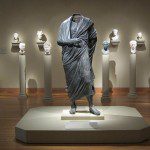Let’s talk about identity. Why? Because it constantly comes up in my FaceBook feed via the interminable (and frankly exhausting) “never say gay” debates. One of the more recent permutations involved an attempt to come up with a new Catholic euphamism for “gay” since “person with a same-sex attraction” is unweildy, “homosexual” suggests that there is more than one sexual orientation and, of course, “gay” is a political term that’s opposed to the gospel. The gospel being more or less conterminous with the Culture Wars, as we all know.
Okay, so snark aside, I think the fundamental problem in the debate over whether Christians can adopt LGBTQ identities is that the word “identity” is being defined in two completely different ways by people on the two different sides of the debate. And, just to make things fun, these two different understandings of identity are based in two very different approaches to understanding the human person.
The first group, those who say that a gay identity is not compatible with identity in Christ, seem to be mapping the very modern word “identity” onto an older set of traditional philosophical categories: “nature,” “essence,” “being.” Within this framework, identity is ontologized. This is understandable. Frankly, within the gay movement there’s a lot of pop essentialism from sloganeers who throw around terms like “my true self” and “who I am” without even stopping to think about the ontological implications of the words. I suspect <shock horror> that in some cases, the propagandists may not even be aware that ontology is a thing.
The second group tend to understand identities as socially constructed categories which have relatively little to do with natures or essences. This is kind of the default usage in postmodern discourses, where metaphysical, cosmological and ontological considerations are generally subordinated to political, existential, and phenomenological concerns. Since the concept of identity is largely rooted in contemporary ways of thinking, I believe there’s a reasonably strong case for decoupling it from ideas like essence and nature. But hey, I’m not actually a believer in prescriptive linguistics so people can use the word how they like.
Still, definitions matter if we want to actually talk to one another, rather than past one another, so I think it’s important to explain what exactly I mean when I use the word “identity.” I’m not saying others have to use it in the same way, just that if someone wants to critique my choice to identify as queer, then their critique has to take into account what I mean by the word “identity.”
I take it more or less for granted that identites are social constructs – that when we claim an identity, we’re basically claiming a relationship of solidarity or unity with another person or group of people. This means that we tend to identify with characteristics within ourselves that situate us socially, but not with characteristics that are socially neutral. So, for example, if a white person has a ruddy complexion they’re probably not going to see that as an important identity which sets them apart from paler people. But most black people definitely identify as black.
Clearly there’s no ontological category, no nature or essence, which allows us to draw an objective line between black people and white people. What there is, is a history, a culture, a shared experience, a whole complex web of socio-political relations which we refer to as “race.” The fact that these categories are, in some sense, fundamentally based on arbitrary distinctions doesn’t make them a fiction. Nor, for that matter, does the fact that these are socially constructed realities mean that people can just opt out.
More importantly, the fact that identities are socially constructed does not, in any way, suggest that they are chosen. We don’t just use identity categories to navigate our own self-constructs, picking and choosing the ones we like as we wind our way through life. Our identities are almost invariably categories imposed on us from without.
Marshal McLuhan put this point very pithily: “Identities are forged by violence.” I’m not sure that this is true in an absolute sense, but it is definitely a very astute observation. For example, the Greeks were not Greeks until the Persians attacked them – before that, they were Athenians, Boeotians, Eretrians, Argives. The cultural and linguistic materials for a common identity were there, but they had not yet been galvanized into a common Hellenic identity. The famous Spartan battle slogan “Freedom of the Greeks!” could never have rallied so much enthusiasm if the Persian war had not preceded the Pelopenesian.
When we form an identity, what basically happens is that some set of socially neutral characteristics becomes socially charged – usually through practices of violence or exclusion. A dominant or powerful group chooses to consolidate its own position by othering some particular set of people. This can be a geographically separated group, or it can be a subset of the original population.
At this point members of the othered group don’t have a lot of choice. Solidarity becomes a mechanism of survival. In the case of the LGBTQ community, it’s not that a whole lot of men and women woke up one morning and decided to form a sinister pink cabal. Rather, it’s that the nascent science of psychology defined the homosexual as an other, and a campaign of violent intervention arose to eradicate these others through a combination of therapeutic and punitive means.
Prior to this point sodomy may have been a socially excluded act – but the mere desire to commit it did not set a person in a category apart. A “sodomite” was a kind of criminal or sinner, defined not by desire but by act. A “homosexual” on the other hand, was a distinct and disordered species of person defined by a common pathology. Gay identity as we understand it today was thus produced by the very mechanisms that (perversely) many conservative Christians still promulgate as means of ‘curing’ gays.
This historical process of othering made the modern gay and lesbian communities – and it can’t simply be dismantled by fiat. Coming up with terminology like “person with a same-sex attraction” doesn’t actually cause those attractions to return to a socially neutral state. Especially not when this terminology is used only within an institution that continues to promote a politics of exclusion – not only for people who transgress its behavioural norms but also for those who have same-sex desires.
So I am queer. Not because I choose an identity that is contrary to the Gospel, but because I have been labelled in this way, categorized by a society that opted to define me as other on the basis of an unchosen aspect of my experience. I can’t actually opt out. I can pretend. I can adopt a euphemism. I can hide in the closet. I can try to pass. But all of these choices ultimately just serve to internalize the politics of exclusion and their painful fruit.
There is no terminological solution to this problem. There is no magic word that will alter hundreds of years of history, or eradicate a complex edifice of social relations, hostilities and accomodations. In so far as Christians have the power to do anything to restore LBGTQ people to a pure and integral identity in Christ, it is by the slow and patient dismantling of practices that construe us as other – not by quibbling over what words we are allowed to use to refer to our exclusion.
Image credit: pixabay













